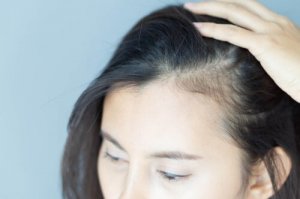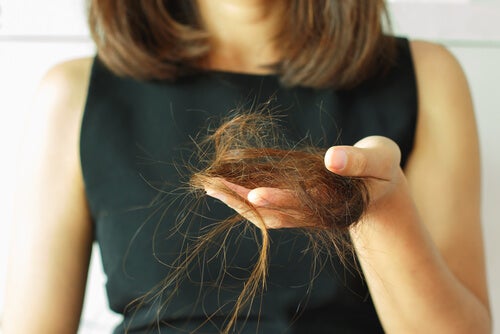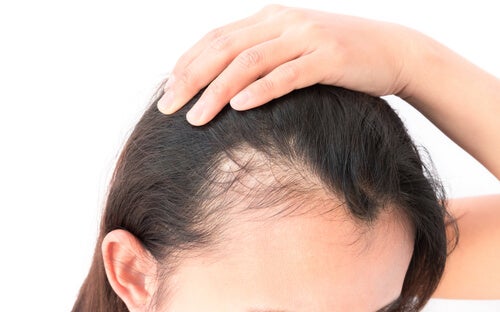The Psychological Repercussions of Alopecia in Women


Written and verified by the psychologist Cristina Roda Rivera
While male baldness is quite common and generally socially acceptable, living with hair loss as a woman can be difficult. If you think about the standards of beauty for women, it’s easy to understand some of the psychological repercussions of alopecia in women.
Alopecia means temporary or permanent hair loss. It can be moderate or severe. Hair loss is considered abnormal if you’re losing more than 100 hairs a day. This aesthetic and psychological problem can also be the first sign of an underlying pathology.
Hair loss can affect the entire scalp or be limited to a particular area. Women with alopecia tend to have an especially hard time seeking help. They often feel ashamed, uncomfortable, and suffer from low self-esteem.

Types of alopecia in women
There are several types of alopecia with varying degrees of severity. The etiology is heterogeneous, which means that the medical and aesthetic treatments vary depending on the person.
Androgenetic alopecia (or female pattern hair loss)
Androgenetic alopecia can affect up to 50% of women. It most commonly occurs during menopause, when estrogen levels drop. This type of alopecia mostly affects the top part of the head and doesn’t usually change the hairline.
However, in very advanced cases, it can affect the entire head. An early diagnosis can usually help stop the hair loss from progressing, increase capillary density (the hairs return to their normal width), and help stimulate new hair growth.
Cicatricial alopecia (scarring hair loss)
Cicatricial alopecia occurs when fibrous scar tissue replaces hair follicles. The scar tissue prevents normal hair growth. This condition can be congenital or acquired.
The primary causes are mechanical trauma (burns, surgeries, etc.), autoimmune disorders (lupus, scleroderma, etc.), bacterial infections (folliculitis), fungal infections (ringworm), viruses (shingles), and tumors.
A trichology study and a histological test are both necessary for an accurate diagnosis.
Alopecia areata
Alopecia areata causes round patches of hair loss on your body. They can happen anywhere. However, they’re most common on the scalp. Unlike other forms of alopecia, the affected zone seems healthy. The skin isn’t flaky, inflamed, or red.
Stress and tension can trigger alopecia areata, but they aren’t the origin of the disease. It’s reversible since the hair follicles haven’t been destroyed and are still there, under the skin.
A trichology study can provide an accurate diagnosis, though sometimes a biopsy or an immunological study is necessary. This kind of alopecia can sometimes lead to alopecia universalis.
Alopecia universalis
Alopecia universalis affects 2% of the population. It can also be related to many other conditions, such as thyroid disorders, type 1 diabetes, allergies, and asthma. It’s similar to other dermatologic diseases such as eczema, psoriasis, or vitiligo.
There’s a genetic predisposition to alopecia universalis. Other triggers or causes are stress, viral infections, and side effects of medications. Usually, alopecia starts with just a small, round patch on the scalp.
This illness is unpredictable. Hair loss can happen suddenly, grow back, and fall out again. It manifests because the immune system attacks the cells of the capillary follicles, which then shrink and stop producing visible hair. Nevertheless, the follicles stay active. If they get the right signal at any moment, they could start producing hair again. That can happen with or without treatment, over the short or long term.
While patients wait for their hair to grow back, they try to find a treatment that works. People have tried stem cell therapy, growth factor therapy, robotic hair transplants… The list goes on. Unfortunately, none of them work. There still isn’t a curative treatment for alopecia.

The psychological repercussions of alopecia in women
For women with alopecia, the repercussions are almost always negative. While it’s socially acceptable for men to be bald, the same isn’t true for women. Women with alopecia often suffer from isolation and depression, among other things.
Thick, healthy hair is valued as a sexual attribute and a symbol of femininity. Losing hair is related to menopause and infertility. Consequently, women with alopecia try to style their hair in a way that masks their thinning hair and avoid going to the pool, beach, or gym. It can even make them isolate themselves socially.
Psychology and dermatology go hand in hand. It’s important to remember that the nervous system and the skin come from the same embrionic layer.
While the origin of alopecia areata has an autoimmune etiology, studies have shown the importance of psychological factors in this kind of alopecia. Many patients talk about an acutely stressful situation when they’re sharing their medical history.
Stress, whether it’s caused by unemployment, a traumatic breakup, or the death of a loved one, can cause immunological changes. This weakens the immune system and can cause T cells to attack the hair follicle.
In conclusion, if you think about the fact that hair loss changes a person’s physical appearance negatively, it’s easy to understand how few women are equipped to deal with the emotional impact of hair loss.
This text is provided for informational purposes only and does not replace consultation with a professional. If in doubt, consult your specialist.








